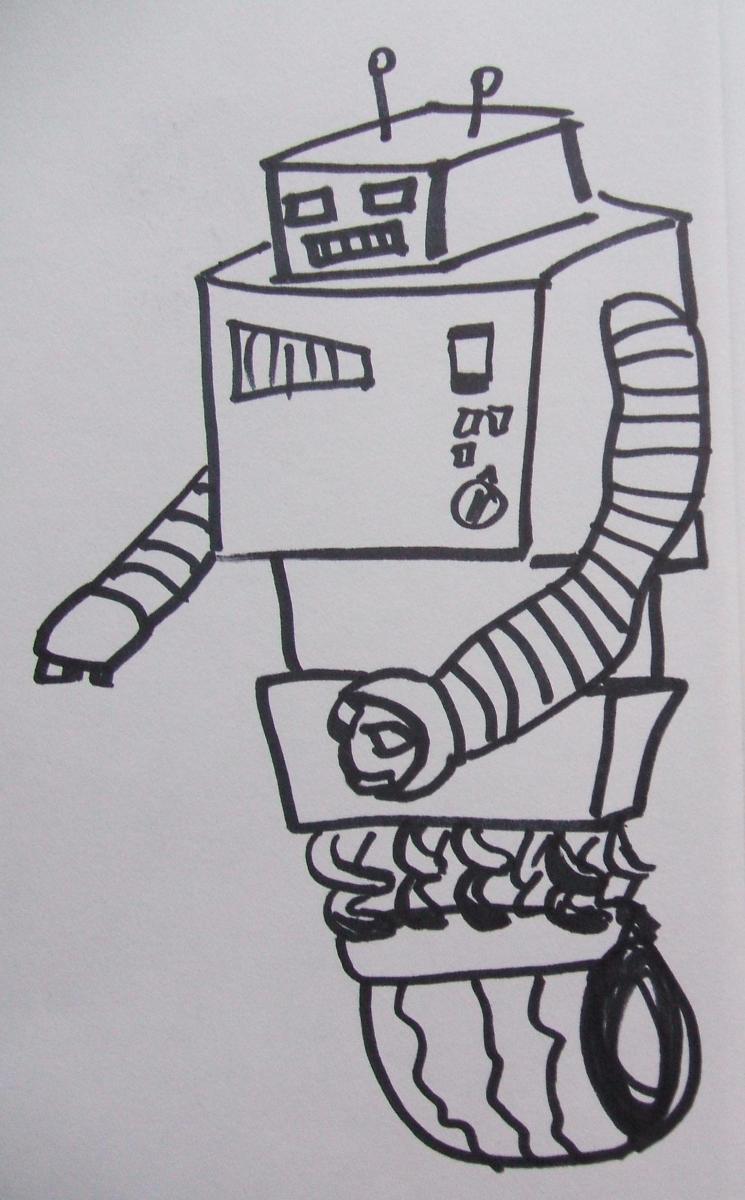How A Robot-Based Economic System Would Work
Suppose we decided that human greed could be eliminated from our economic system if we allowed robots to handle money, resources, and commodities, instead of allowing human beings to do it. Human beings have a trait called 'greed' and since robots lack this trait, it would be logical to allow robots to handle all of our money and resources. If robots performed all the work that was done by human beings, then humans would become denizens of a welfare state that was run by robots.
Suppose robots controlled all the farms, so we had robots performing farm labor instead of humans toiling on the farms. A robot could come up to you with a plate of fruit and the robot would give the fruit to you, and the robot would say, 'I grew this fruit, I'll pay you to eat it'. Suppose we had robots, instead of people, working in all our garment factories. A robot would come up to you and the robot would give you a package of clothing, and the robot would say, 'I made these clothes for you, I'll pay you to wear them.' The human recipient of these gifts would be like a denizen of a welfare state, but instead of getting a welfare check from a government, he would be getting small payments from robots. From time to time, a robot would give him an item, and would pay him to use that item.
At first, it would just be small items like packages of food, packages of clothing, and so on. After a while, the robots could produce bigger and bigger things to give away to human beings, eventually, they could give away cars and houses. Imagine a robot coming up to you and handing you a set of keys. The robot would say, 'I built a car, I'll pay you to drive it'. You'd look outside and you'd see a brand-new car parked outside your house. Another robot might come to you with a set of keys, a when the robot gives you the keys, it says, 'I built a house for you, I'll pay you to live in it'. Then you look outside, and you see a brand-new house has been built in the vacant lot across the street! It's your new house, waiting for you to move in! So, in this system, the robots are doing all the work, but you aren't paying the robots to work. Instead, the robots are paying you to enjoy the fruits of their labor.
So, how is all this going to be possible? I could compare a robot-based economic system to a communist political system. In a communist political system, the human trait we know as 'greed' is officially outlawed and all the property in the country is owned by communists instead of greedy capitalists. After the communists take over, they administer all the property and resources for the good of all the people in the country. In a robot-based economic system, it is understood that human labor is too expensive to support and too inefficient to tolerate, so all the human labor is replaced by machines. At that point, you have robots doing all the work, and all the human beings in the system are sitting around doing nothing. Since robots are not capable of greed, like human beings, it would be logical to give robots control over all the property and resources in your country, so the robots would have total control over agricultural and industrial production.
The robots in this economic system would do all the work that was formerly done by humans, and the robots would also provide money to humans, by paying humans to use the things they make. You could argue that this is impossible, and to a certain extent, you'd be correct. A utopian system where robots paid people to drive cars is not possible because the cars are made of materials that cost money ,and the robots don't have any way to pay for the materials. A robot-based economic system becomes much more plausible if you take recycling into account.
Human beings throw away millions of tons of materials every year. They throw away glass, in the form of glass bottles and jars. I think everyone has seen a glass jar of olives or pickles at the grocery store.What happens to that glass jar after the olives or pickles have been eaten? Very little of the glass is actually being recycled, most of it goes into a landfill. The first step towards creating a robot-based economic system would be giving robots control of our trash. We throw away all kinds of materials, including metal, glass and plastic, robots could make good use of these materials by recycling them, turning the recycled materials into products, and then paying us to use those products.
I think the average person wouldn't want to give a gold mine to a robot, because they wouldn't trust robots with the gold, but the average person would gladly give a mountain of trash to a robot, because he just wants to get rid of the trash! So, giving all of our trash to robots, and allowing robots to recycle our trash would be the first step towards creating a robot-based economy. Trash is a resource that the robots can get for free, and another thing that robots can get for free is energy. The sunlight that shines on the Earth is free, robots can manufacture solar panels that convert that sunlight into electricity. The wind is free, robots can manufacture windmills that convert wind energy into electricity. The free energy that robots get from windmills and solar cells could be used to provide power to trash-recycling facilities.








